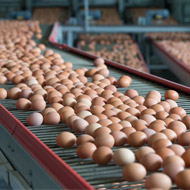Contaminated eggs found in 15 EU countries

Belgium, the Netherlands, Germany and France have been blocked from selling eggs after the detection of Fipronil.
Eggs contaminated with Fipronil have been found in 15 EU countries, as well as two non-EU member states, the European Commission has confirmed.
In a press briefing on Friday, agriculture spokesperson Daniel Rosario told reporters that farms in four countries - Belgium, the Netherlands, Germany and France — have been blocked from selling eggs after the detection of Fipronil.
He said that contaminated eggs have been found in at least 11 other EU member states — Sweden, the United Kingdom, Austria, Ireland, Italy, Luxembourg, Poland, Romania, Slovakia, Slovenia, Denmark — as well as in Switzerland and Hong Kong.
According to reports, ministers and national regulatory agencies are set to meet in September in a bid to get countries to stop “blaming and shaming” each other over the Fipronil scare.
In a statement to news agency Reuters, EU commissioner Vytenis Andriukaitis said: ‘We need to work together to draw lessons learned and move forward instead of losing energy on finger pointing.’
Millions of eggs have been removed from supermarket shelves across Europe due to the presence of Fipronil - an insecticide banned by the European Union from use in the Food Industry. The contaminated eggs originated from the Netherlands.
Last week, the Food Standards Agency confirmed that 700,000 eggs had entered Britain from contaminated Dutch farms, affecting processed food such as sandwich fillings and other chilled foods. The products have been withdrawn by the businesses involved.



 The Animal and Plant Health Agency (APHA) has updated its online reporting service for dead wild birds.
The Animal and Plant Health Agency (APHA) has updated its online reporting service for dead wild birds.